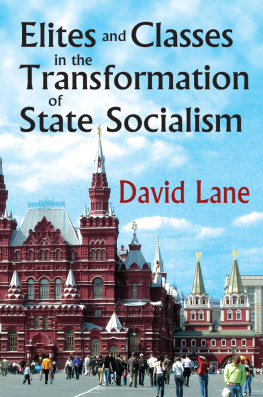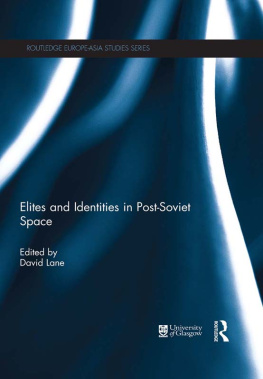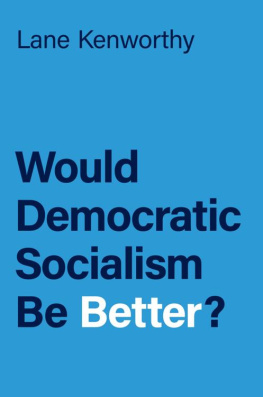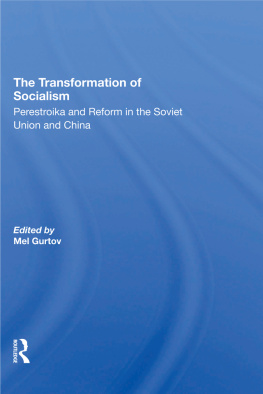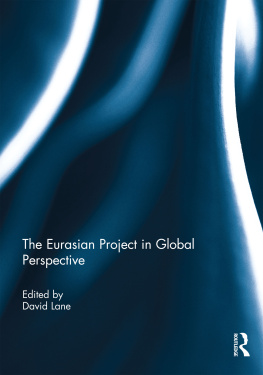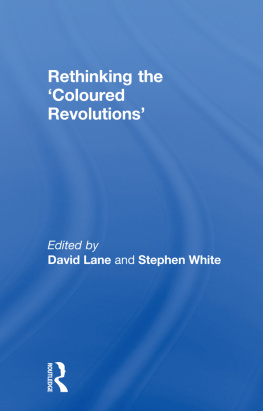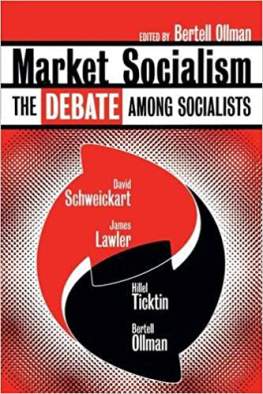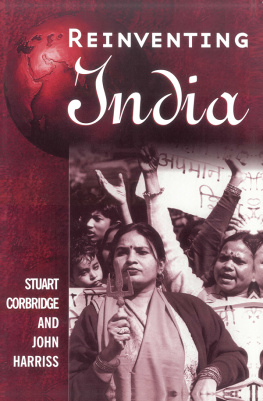Elites and Classes in the Transformation of State Socialism
Elites and Classes in the Transformation of State Socialism
David Lane
First published 2011 by Transaction Publishers
Published 2017 by Routledge
2 Park Square, Milton Park, Abingdon, Oxon OX14 4RN
711 Third Avenue, New York, NY 10017, USA
Routledge is an imprint of the Taylor & Francis Group, an informa business
Copyright 2011 by Taylor & Francis.
All rights reserved. No part of this book may be reprinted or reproduced or utilised in any form or by any electronic, mechanical, or other means, now known or hereafter invented, including photocopying and recording, or in any information storage or retrieval system, without permission in writing from the publishers.
Notice:
Product or corporate names may be trademarks or registered trademarks, and are used only for identification and explanation without intent to infringe.
Library of Congress Catalog Number: 2011005798
Library of Congress Cataloging-in-Publication Data
Lane, David Stuart.
Elites and classes in the transformation of state socialism / David Lane.
p. cm.
ISBN 978-1-4128-4231-0 (acid-free paper) 1. Elite (Social sciences)Soviet Union. 2. Social classesSoviet Union. 3. Social changeSoviet Union. 4. Post-communismRussia. I. Title.
HN530.Z9E447 2011
305.52094709049dc22
2011005798
ISBN 13: 978-1-4128-4231-0 (hbk)
Contents
In February 1986 Mikhail Gorbachev launched his program for the reform of state socialism. It heralded a rebuilding (perestroika) of the Soviet Union. By December 1991, the USSR had split into fifteen independent states. All began a transition from communism to something elsea process legitimated in terms of freedom, electoral democracy, and the market.
After twenty years of transformation, this book examines the forces that led to the fall of communism, and who subsequently benefited and lost from it. At the center of the discussion is the definition and role of elites and classes. In the first part of the book, elite theories of change are contrasted with class-based theories, which consider transformation in terms of revolution.
A major concern of the author is the global context and the role of the hegemonic Western states in tilting the balance in favor of a capitalist revolution. The author considers the position of the post-Soviet states in the world system. The book discusses the peculiar formation of a capitalist class in Russia and the type of capitalism that is evolving. These chapters rely on the authors research in Russia and Ukraine. His research into the Russian oil and banking sectors is used to illustrate the significant moral and political divisions between the members of the Soviet and post-Soviet economic and political elites.
The author acknowledges the financial support provided by the British Economic and Social Research Council, the Leverhulme Trust, and the British Academy. The writing is informed by the testimony of members of the Soviet and Russian political elites. They provide a record of the break-up of the USSR and transformation as seen by people at the top of Soviet and Russian politics. These views are supplemented by public opinion polls, giving the views of those who have been the subject of transformation.
David Lane
Cambridge University
October 2010
Interest in the elite analysis of politics of Western societies has declined since the 1970s.1 This decline, however, coincided with a revitalization of the study of political and economic elites in the field of development and transition studies which later inspired the political analysis of the social transformations of the state socialist societies. These approaches were related to a more historical understanding of social and political change stimulated by writing, such as that of William Bendix, which indicated that the formation of the nation-state in the West and Japan resulted in disunifed or antagonistic elites.2 Elite instability in turn, it was contended, resulted in regime volatility, a high incidence of political violence, and frequent changes in the make up of government. Modernization theory of the 1960s which envisaged the democratization of politics as a consequence of structural changes in industrialization and urbanization was replaced by an emphasis on elites which could craft democratic change. Elites became the movers of transformation in Latin America, southern Europe, and later in the post-socialist societies.
In this book I criticize this approach. While recognizing the role of elites as agents of change and possessing transformative capacities, I contend that elites have to be contextualized in relation to institutions and classes, and that the rise of dominant, ruling, or consensual elites has a social structural basis. In the post-socialist societies, it is particularly important to define the interests which are supported and promoted by elite pacts, as well as those groups who are excluded. The role of international influences is considered to be a major causal factor in political and social change in the post-communist countries.
In the 1960s, social change in the Third World was analyzed in terms of socio-economic variables. S. M. Lipsets mobilization theory3 contended that social prerequisites were necessary determinants of democratic regimes: democratization would be consequential on modernization (education, urbanization, rising wage incomes, and class formation). Until a country reached a threshold given by levels of industrialization and social development, it would remain non-democratic. In such theorizing, elites were recognized as political actors, but they were attached to the stratified class system. Analysis, however, began to change in the late 1970s when elites became decoupled from classes.
Following the fall of dictatorial regimes in southern Europe, American academics sought to influence the policy process to secure political and economic stability in changing societies. The Asian model of strong authoritarian states and weak societies predicated on socially undifferentiated and economically backward societies, it was contended, was overdetermined: authoritarian systems were only one, and an undesirable, way to achieve social development. Thinking shifted to viewing actors, rather than structures as vital to promote democratic change. Transition theory associated with writers such as Schmitter, ODonnell, Di Palma, and Higley,4 shifted the focus to elites engaging in compacts and settlements, with actors crafting constitutions and institutions to a democratic design. Elites then were regarded as the key political variable to explain both stability and instability. Such thinking was stimulated by the move to democracy of authoritarian states in the South. Spain, Portugal, Greece, and many Latin American societies moved toward pluralistic political regimes with competing electoral parties, and legitimation of Western-type political rights.
A significant paradigm shift occurred. Whereas previously, writers had conceived of ruling political elites in social structural forms, political leadership was now considered a consequence of political events, of political management. Policy makers were concerned to craft democratic regimes favorable to the West and to prevent the rise of authoritarian or statist regimes sympathetic to communism. Elite stability, they argued, was a key variable. Emphasis was put on forms of leadership, consensus building, crafting institutions, and the role of committed political actors to promote democratic solutions. The political dynamic for a move to democracy, it was contended, comes from above in the form of elite-led transitions.5 A stable democracy in turn would satisfy the conditions for economic growth and prosperity. An important component here is the exclusion (even suppression) of interests which contest the assumptions on which democratic politics rest (the rules of the game) and on which society is to be governed.


